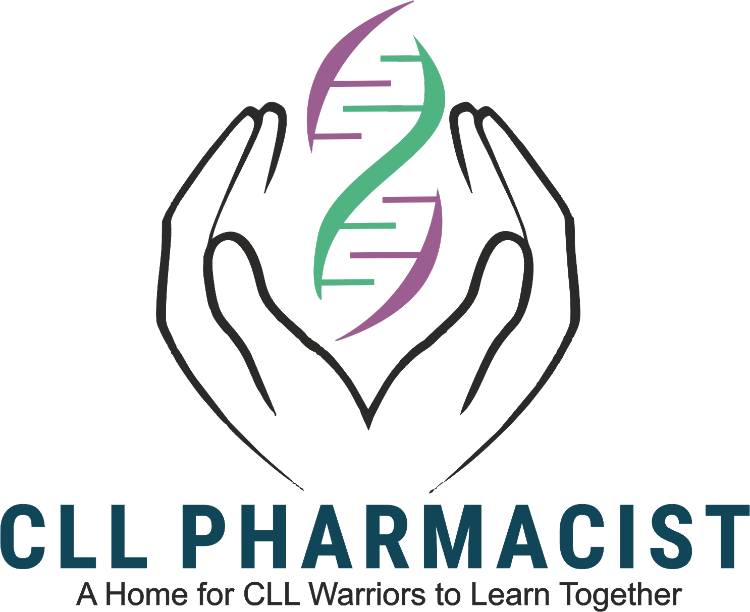CLL Research – RESONATE-2 Study of Ibrutinib as Frontline Treatment of CLL: Seven Year Follow-Up Data
Dr. Paul M. Barr, MD of the Wilmot Cancer Institute, University of Rochester (NY), a CLL specialist and Professor of Medicine, is the lead investigator of the RESONATE-2 study of Ibrutinib as first-line therapy for chronic lymphocytic leukemia (CLL). Dr. Barr presented a poster at the 2021 Annual Meeting of the American Society of Clinical Oncology (ASCO) in June 2021. The poster’s title is Up to Seven Years of Follow-up in the RESONATE-2 Study of First-Line Ibrutinib Treatment for Patients with Chronic Lymphocytic Leukemia. (Abstract 7523)
Background – RESONATE-2 Study of Ibrutinib
The RESONATE-2 trial is an international Phase 3 clinical trial that began in March 2013. The trial’s design compared the two oral agents, ibrutinib and chlorambucil, in previously untreated older patients with CLL or small lymphocytic lymphoma.
Clinical trials for cancer never use placebo for the control arm of a study; instead, they use an existing approved standard of care. At the onset of RESONATE-2, chlorambucil had been a frequently used standard first-line therapy in CLL, especially for older patients or those with coexisting conditions. In 2013, Until recently, no treatment was clearly superior to chlorambucil in this population. Fludarabine or bendamustine are associated with higher response rates and more prolonged progression-free survival than those with chlorambucil. Unfortunately, both are associated with higher rates of toxic effects, and neither provided an overall survival benefit. The age of patients and the propensity to have multiple co-morbidities led to the choice of chlorambucil for the control arm.
Ibrutinib (Imbruvica®) is the first-in-class oral covalent inhibitor of Bruton’s tyrosine kinase (BTK) approved to treat patients with CLL.
The RESONATE-2 study of ibrutinib vs. chlorambucil clearly showed the superiority of ibrutinib for progression-free survival (PFS) and overall survival (OS). As a result, Resonate-2 was one of the primary clinical studies that led to the approval of ibrutinib by the FDA. Some patients who entered this trial in 2013 remain in the study and on ibrutinib therapy. This paper deals with the follow-up of patients up to seven years after entering the trial.
Methods – RESONATE-2 Study of Ibrutinib
The RESONATE-2 study of ibrutinib evaluated 269 patients 65 years or older with previously untreated CLL/SLL without deletion (17p). Half these patients received either continuous single-agent ibrutinib (420mg) as oral capsules until they experienced disease progression. The other half received weight-based doses of the oral agent chlorambucil daily for up to twelve 28-day cycles. The chart below shows patient characteristics at their joining the study.
Results – RESONATE-2 Study of Ibrutinib
With up to a seven-year follow-up (median 74.9 months; range, 0.1-86.8), significant PFS benefit was sustained for patients treated with ibrutinib vs. chlorambucil. PFS at 6.5 years was 61% in patients who received ibrutinib vs. 9% for those who received chlorambucil. The PFS benefit showed across all subgroups, including ibrutinib treated patients with high-risk genomic factors such as unmutated IGHV or deletion 11q. (Remember del (17p) patients excluded.)
Patients who received ibrutinib had a 78% overall survival at the 6.5-year point. The ORR for ibrutinib-treated patients was 92%. Complete responses (CR) increased to 34% with this follow-up.
The ongoing rate of grade 3 or higher adverse events of interest remained low for hypertension (5-6y interval: 5%, n=4; 6-7y: 4%, n=3) and atrial fibrillation (5-6y interval: 1%, n=1; 6-7y: 1%, n=1). Dose reductions due to grade ≥ 3 adverse events (AEs) occurred in 1% (n=1) patients during the 5-6y and 6-7y intervals. Across the full follow-up, 31 patients had dose reductions for any-grade AEs, of whom 22 of 31 (71%) had resolution or improvement of the AE. The primary reason for discontinuations in the 5-7y group was disease progression (5-6y: 5%, n=4; 6-7y: 6%, n=4). Two patients (3%) discontinued ibrutinib due to adverse events during the year 5-6 interval, and none stopped in the year 6-7.
At the seven-year follow-up point, 47% of patients remain on single-agent ibrutinib.
Conclusions - Seven Year Follow-up of RESONATE-2 Study of Ibrutinib
Dr. Barr summed up this report by saying, “the key takeaway from RESONATE-2 study of ibrutinib is that with this single-agent - progression-free survival and duration of disease control better than we previously expected.” But, he added, “I don’t think anyone envisioned early on that at this late follow-up, we still would not have reached the median PFS point. (The point at which more than 50% of patients have progressed.)
Ibrutinib was the first targeted agent approved for the treatment of CLL. The RESONATE trial led to the initial FDA approval of Imbruvica® for relapsed or refractory patients in 2014. Later, the RESONATE-2 study of ibrutinib in treatment naïve patients resulted in the FDA approval as a first-line treatment in 2016.
Ibrutinib truly changed the way we treat CLL. Before this clinical trial, the only treatment options available were traditional chemotherapy or a combination of chemo and immune therapy. Unfortunately, these treatments were associated with high rates of adverse events and long-term consequences of treatment such as cardiac, kidney, or liver toxicities or increased risk of secondary cancers. In addition, patients with deletion 17p or TP53 mutations responded poorly to these older agents and had dismal survival rates.
The RESONATE-2 study of ibrutinib represents the longest Phase 3 survival data for any BTK inhibitor. Acalabrutinib (Calquence®) and zanabrutinib (Brukinsa™) are second-generation BTK inhibitors and are much newer. Calquence® received FDA approval for CLL in November 2019, and Brukinsa™ is currently only approved for relapsed/refractory Mantle Cell Lymphoma as of January 2020. An application for approval of Brukinsa™ for CLL is pending FDA review.
Safety data from RESONATE-2 indicated that most rates of “any grade” adverse events decreased over time or remained stable over time, and there were no new safety concerns reported.
Many CLL patients are alive today because of ibrutinib. I count myself among that number. I began ibrutinib as my first treatment for CLL one month after the FDA approval for treatment naïve patients in 2016.


